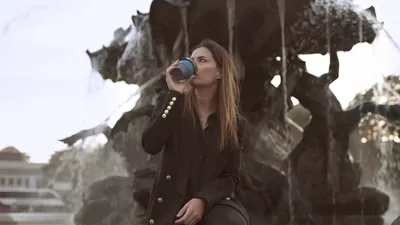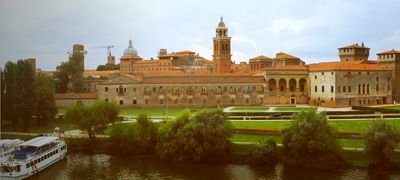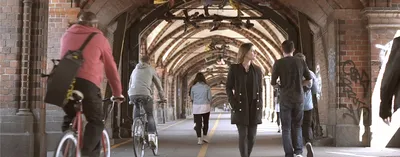How coffee aroma comes alive – Giulia visits a small roastery in Berlin.
When Giulia met Ersin from Coffee Circle, she was overwhelmed by the work and options behind a seemingly uncomplicated drink that almost everyone has every day.
Berlin is a cosmopolitan, trendsetting city in many different ways, including its architecture, museums, galleries and underground scene. It has been and still is the home of many influential artists. It’s a beautiful mix of modern and old, and cultures and languages. It has an impressive number of cafes and range of coffee from all over the world – and a small roastery in Berlin Mitte, which Giulia visited during her trip to Berlin to learn more about coffee roasting processes, flavours and aromas.
“Roasting is a craft that is critical to the taste of coffee”, Ersin from Coffee Circle says. There are different roasting profiles for each coffee to create different blends. Coffee has around 800 different aromas and flavourings, which is almost twice as many as wine has! So, before roasting, the green coffee bean is raw and has no real flavour. Depending on how long and how hot the roasting is, different flavours will develop. After the roasting is done, the coffee is cooled down. Only after the rest period that takes about five to ten days, can coffee develop its full aroma.
To have the perfect coffee experience, it’s always better to opt for coffee beans rather than pre-ground coffee. Coffee beans preserve the quality and aroma for longer. Once the bag is open, the coffee should be consumed as quickly as possible – within a maximum of four to six weeks, otherwise the aroma fades away. In addition to the coffee beans, good water is also needed – and for sure the right coffee machine.
Giulia interviews Ersin during her visit to the coffee roastery in Berlin.
Ersin, how did you become a coffee expert? What was your motivation for this vocation?
I was working at an agency as a project manager but was secretly dreaming of working in the coffee sector. Then coincidentally our office moved to a location across the street from my favourite coffee shop. As I became a regular there, the team and I developed a good friendship. When they had an open position, I applied and they put me in charge of marketing, supporting their brand and projects. I was really eager to learn so I gained plenty of knowledge on the job.
Do you have special rituals or coffee varieties that you prefer?
I try to use my weekends to visit different cafes – I sit at the bar and talk with my friends over a cup of great batch brew coffee. I am a fan of washed, floral Ethiopian coffee. I can drink it any time of the day.
How do you see the coffee culture in Germany (especially in Berlin)?
Making a general statement regarding Germany is not so easy. In Berlin, coffee culture is very vibrant and constantly growing. I believe the expat community also has a big influence on it. I know that Germany has a long-standing culture of drinking filter coffee and it is somehow perceived as a relatively low-quality coffee. I like it when people are surprised drinking a well-brewed filter coffee.

How coffee culture is characterised in Germany.
Germany is famous for its old tradition of meeting for coffee and cake in the afternoon – the so called Kaffeeklatsch, which is a stereotype when thinking about German coffee culture. A cup of freshly prepared filter coffee and a piece of good cake were intended to be a short form of relaxation from stressful everyday life. Enjoying coffee and cake together was a welcome opportunity to be with family and friends and to exchange news back in the days.
The Germans’ love for coffee began in the 17th century when the first coffee house opened in Bremen in 1673. The cities of Hamburg, Regensburg, Leipzig, Würzburg and Berlin followed. Back then, coffee was a luxury item and reserved only for the nobility or privileged citizens.
Since 1965, coffee has been the favourite drink of the Germans – even more so than beer. Coffee consumption is higher than in Italy, for example. Whether at home, in a cafe, in a coffee house chain or a little roastery, in Germany there is always an opportunity to be part of the coffee tradition. But how do Germans prefer to enjoy their coffee today? Do they prefer filter coffee in times of the chai latte, espresso and iced coffee? Major coffee house chains can be found on every corner – it’s hard to miss them.
The pure form of coffee seems to be dying out there, but this gives off the wrong impression – the majority of Germans actually stick to filter coffee! It’s actually a large majority too – 65.7% of Germans prefer to drink filter coffee rather than any coffees using other preparation methods. This return to filter coffee is also a symptom of the ‘third wave of coffee’ that we have been in since the turn of the millennium. Here, the actual pure coffee taste and coffee as a real natural product is making a comeback.
What destinations in Berlin would you recommend to enjoy art, culture, and food and drink?
My favourite museum in Berlin is Hamburger Bahnhof. They have an amazing permanent collection and great seasonal exhibitions. For food and drink, Berlin is a great city with a huge variety to discover. The list is too long! But my current favourite place to go for a nice, casual dinner is St. Barts. They have a solid selection of cocktails, and very smart sharing platters, snacks and modern pub food. During the summer time, I love Motel’s brewery. It is a bit outside of the city, which makes it great for a short bike tour, and they host cool pop-up events every other weekend.
Ersin, where did you have the best coffee you have ever had? What was different about it?
I wouldn’t say it was the best coffee I ever had, but I had a game-changing coffee in Chicago back in 2009. Until then, I had no idea coffee could be something so flavourful.

When coffee becomes art
How Giulia Bernardelli was inspired by her hometown and a natural coffee stain to create amazing artworks.
Read more








